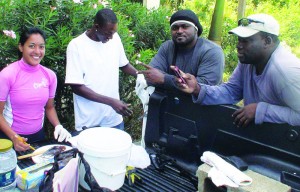
Fadilah Ali, a PhD student at University of Southampton, has returned to Anguilla to continue research on the invasive lionfish. For the past month she has been conducting lionfish density surveys in the coral reef and seagrass habitats of Anguilla’s marine environment.
Ms. Ali is working in association with the Department of Environment (DOE) and the Department of Fisheries and Marine Resources (DFMR) in collecting vital data that will assist Anguilla in monitoring and managing the Lionfish. As part of this initiative, she will also be involved in further education and outreach activities targeted towards fishermen, hotels and restaurants, students, divers and the general public.
A special session on Safe Handling and Preparation of Lionfish will be held at Paradise Cove Resort from 2.00 pm to 4.00 pm on Wednesday 5th February 2014. This session is organized to target chefs and other restaurateurs. Additionally, a General Public Education and Awareness session on the Lionfish will take place at 7.00 pm on Thursday 6th February 2014 at the Orealia Kelly Primary School in Stoney Ground. The general public is invited to attend and ask as many questions at this open forum.
The Lionfish, which is native to the Indo-Pacific region, has invaded the Atlantic Ocean since 1992, and was first sighted/recorded in Anguilla’s waters in 2010. The fish has venomous spines, but once these are carefully removed, the Lionfish is eaten by many persons. The fish is served in some restaurants in the Western Caribbean, and it is also used as a niche export from Jamaica.
This Lionfish project is part of the output of the Anguilla Invasive Species Strategy. It is spearheaded by the DOE in collaboration with the DFMR, and it is funded by Joint Nature Conservation Committee (JNCC), a United Kingdom -based environmental agency which has been instrumental in building local capacity, and working closely with the Government of Anguilla for many years.
Persons interested in finding out more information about this project can contact the Department of Environment at 264 497 0217 or email environment@gov.ai .
– Contributed







